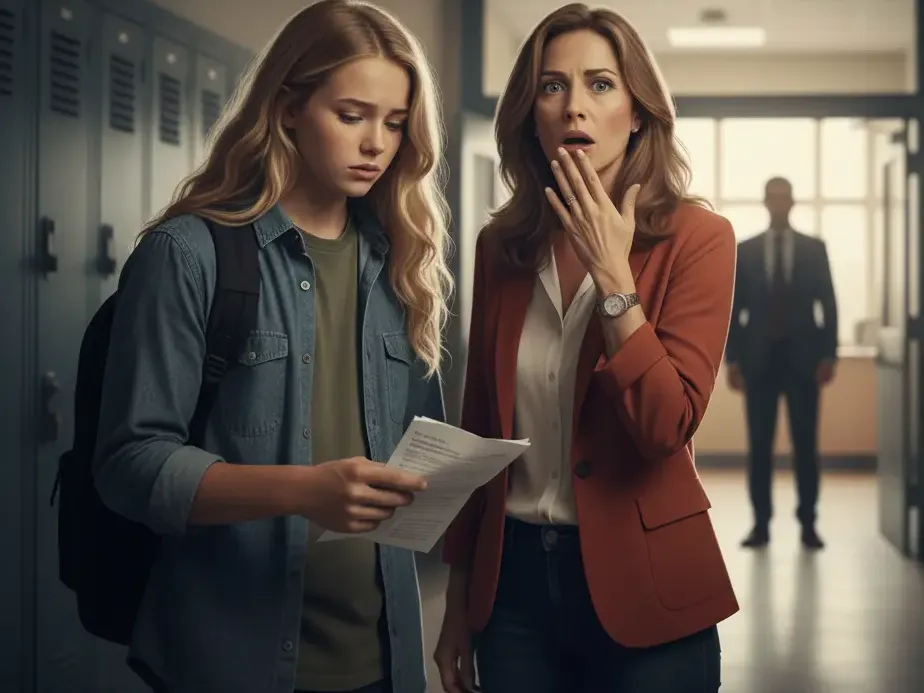The mother froze as the office door clicked shut behind her. Across the desk, the new principal sat motionless, papers neatly stacked, eyes fixed with unsettling calm. Something in that stare churned her stomach. She had expected authority, even hostility—but not this silent, piercing recognition.
A lifetime of forgotten classrooms and buried mistakes seemed to rise at once. Her daughter shifted beside her, restless and unaware, while the air between the two adults thickened with unspoken history. The mother’s palms dampened. She knew this face. And if she was right, everything was about to collapse.
The principal leaned forward, voice measured but edged. “We’ve met before.” The words were offered coolly, almost cordially, but they struck like a verdict. The mother forced a smile, rehearsed, brittle. She had hoped the past would never resurface. She was wrong…
Carol often told herself the trouble began the day John, Diane’s father, left. It was as if the silence he left behind seeped into their home and rewired her daughter’s laughter into defiance. One parent could pay the bills, yes, but could one parent anchor a storm?

As the only breadwinner, Carol had spent nights stocking shelves, mornings in an office, and afternoons juggling errands. The space in between was where Diane grew wild—her mischief sharpening, her patience thinning. Carol blamed herself for each expulsion. Too little attention, and too many apologies said through tired eyes.
On this day, the cycle repeated. Diane was caught mocking a teacher mid-lesson, and by afternoon, Carol found herself in the principal’s office, pleading. “She’s had two expulsions already. Please—if you expel her again, no school will take her.” Her voice cracked with exhaustion, equal parts shame and fear.

The principal, old and weary, rubbed his temples. “You understand she leaves us little choice. Disruption cannot go unchecked.” Carol leaned forward, desperation bleeding into her tone. “Give her one more chance. Please. She’s not a bad kid. She just—needs someone to believe she can do better.”
After a pause that stretched unbearably, the principal sighed. “Very well. She may stay until the term ends. But our new head will arrive soon, and discipline will be stricter. I won’t be here to shield her anymore.” Relief and dread collided in Carol’s chest.
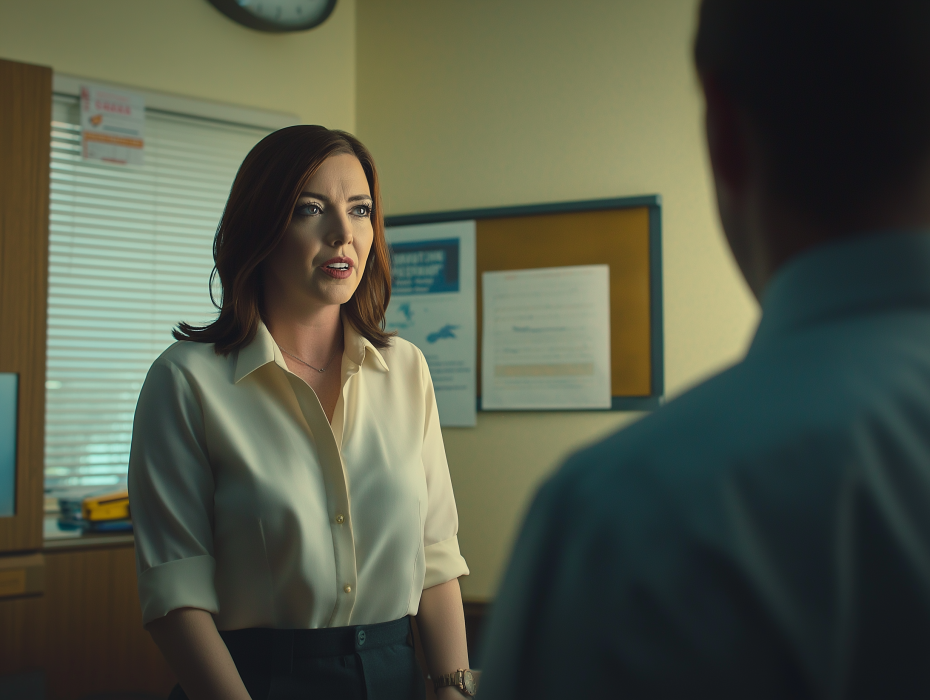
That evening, Carol confronted her daughter gently. “Please, Diane. Don’t push too far this time. I can’t fight forever for you. Just… try to be calmer, and not create such a ruckus.” Her voice wavered. Diane rolled her eyes but finally muttered, “Fine, Mom. I’ll try.” It wasn’t much, but it was hope.
For the first time in weeks, Carol exhaled without feeling her lungs collapse. She allowed herself to dream of calm—of her daughter finding balance, of teachers seeing the girl beneath the troublemaker. She whispered to herself as she folded laundry that night: “Maybe this time it will work.”

The fragile peace was shattered the next afternoon. Diane stomped through the front door, dropping her bag with a thud. “Guess what,” she said with a grin that didn’t reach her eyes. “We’ve got a new principal. And you’ll never believe the name—Winters. Dark, no?” Carol froze before she even heard it.
The full name slipped from Diane’s lips like a stone into water, ripples spreading instantly across Carol’s chest. Recognition slammed into her, cold and merciless. She forced a neutral expression, nodding as if the sound meant nothing, while inside, the past stirred awake, demanding her attention.
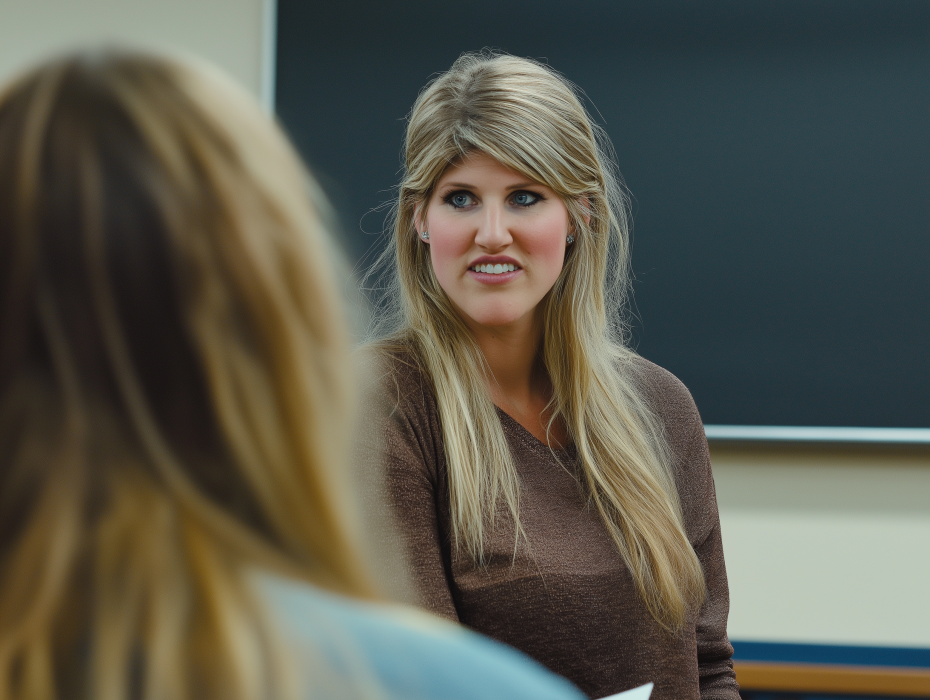
As if the situation weren’t fragile enough, one teacher in particular seemed intent on breaking Diane’s resolve. Mrs. Connors, the history teacher, always singled her out—correcting her harshly, mocking her mistakes, and feeding the class’s laughter. Every detention Diane earned seemed to trace back to her barbed remarks.
Carol noticed the change in her daughter’s tone when she spoke of her. Diane’s arrogance wavered, replaced by simmering resentment. “She hates me,” she spat one night. “She just wants me gone.” Carol pressed her lips tight, remembering too well how cruelty from adults could outlast childhood.

The prospect of a meeting with the new principal filled Carol’s heart with dread. The hallway walk, the waiting room, her daughter’s defiance—all of it would unfold just as before. But this time, dread wasn’t born of expulsion alone. It was born of memory, of recognition, of the face waiting inside.
Carol spent the weekend in restless silence, replaying her daughter’s words. The name wouldn’t leave her mind. She kept whispering it while washing dishes, folding clothes, and even while staring blankly at the television. It clung like smoke. Whatever hope she’d clung to was already unraveling.

On Monday morning, Diane dragged her feet to school, muttering complaints. Carol kissed her forehead anyway, whispering, “Just try today. For me.” Diane shrugged and walked off, headphones jammed in her ears. Carol lingered at the curb, watching until her figure disappeared, her heart a knot of unease.
That afternoon, the call came. Diane had disrupted Mrs. Connors’ class again—this time refusing to read aloud when singled out. “She mocks authority,” she said, her tone laced with disdain. Carol apologized quickly, biting back the anger that rose. She knew her voice too well: the bully’s cadence.

When Diane returned home, she was seething. “She doesn’t even try to hide it,” she snapped. “She wanted me embarrassed. She wanted everyone to be laughing at me.” Carol pressed her lips together, listening without interruption. She thought of her own schooldays, when laughter had cut just as deeply as words.
The cycle repeated itself in the following days. Each report from school bore Connors’ signature, each note another bruise against Diane’s record. Carol wondered if teachers realized how much power they wielded—or if they cared. History, it seemed, had a cruel way of looping back.

By midweek, Diane’s patience snapped. She tossed her backpack across the room and shouted, “Why bother trying if they already hate me?” Carol flinched at the words, recognizing her daughter’s despair wrapped in defiance. She wanted to argue, but guilt silenced her. She had no easy answer.
That night, Carol sat with Diane’s stack of warning slips spread across the kitchen table. Two schools. Two records. Two chances squandered. Her reflection in the window looked like a stranger’s—eyes hollow, shoulders hunched. She whispered, “This isn’t her fault. It’s mine,” though the silence offered no absolution.

The following morning, the school called again. “Mrs. Greene, we need you to attend a meeting. The new principal has requested it personally.” The words were polite, but Carol’s stomach twisted. The time she’d been dreading had arrived, dragging the past with it.
Diane reacted with her usual bravado. “Guess I’m that important, huh?” she smirked. But beneath the sarcasm, Carol noticed her fidgeting, her restless tapping fingers. Her daughter wasn’t immune to the tension, though she hid it behind jokes. Carol wished she could do the same.

In the supermarket later that day, Carol overheard two parents whispering about the new head. “Sharp as a blade, that one,” one said. “Doesn’t forget a thing.” The words sliced through her like ice. She dropped a can from her basket, the metallic clatter echoing too loudly.
That night, sleep deserted her. Memories surfaced in fragments: hallways filled with mocking laughter, a girl shrinking into herself, Carol’s own voice raised cruelly, echoed by others. She pressed her hands over her ears, but the echoes persisted. Some ghosts, she realized, didn’t fade. They waited.

Morning came gray and damp. Diane shuffled into the kitchen, still chewing on toast, and asked, “Why do you look like you haven’t slept in a week?” Carol forced a smile. “Just nerves. Important day.” She kept her tone light, though her chest tightened at the thought.
During the drive to school, Diane fiddled with the radio, humming tunelessly. Carol gripped the steering wheel until her knuckles whitened. She wanted to reach out, to explain everything, but the words tangled. How could she tell her daughter the truth when she barely faced it herself?

As they pulled into the lot, Diane leaned back, sighing. “Another lecture, another wasted morning.” Carol glanced at her, torn between anger and pity. “Listen,” she said softly, “not everything is a joke. Sometimes, what you say sticks with people longer than you think.” Diane rolled her eyes.
Inside the school, the corridors buzzed with whispers. Teachers exchanged looks as Carol passed, her daughter trailing behind with defiant swagger. At the end of the hall, the secretary gestured toward a closed door. “The principal will see you now.” Carol’s pulse quickened. The past was waiting inside.

The secretary’s smile was polite but rehearsed. “Please wait here,” she said, gesturing to two chairs outside the office. Diane slouched into one, legs swinging, tapping the wall with her heel. Carol sat stiffly beside her, every tick of the clock pounding like a warning drumbeat.
Through the frosted glass, Carol heard muffled voices. Staff passing files, footsteps crossing carpet, a chair scraping. Each sound sharpened her nerves. She stole glances at the blurred figure moving inside. Familiarity tugged at her, fierce and undeniable, though she couldn’t yet place why her chest constricted so tightly.

Diane, impatient, huffed loudly. “This is ridiculous. She’ll just say I’m rude and you’ll say I’ll improve. Same old.” She grinned at her own sarcasm, but Carol shushed her sharply. Her nerves weren’t about a lecture. They were about the person behind the door—and the history clawing to resurface.
When the office door opened briefly, a staff member exited with a stack of files. Carol caught the faintest glimpse—a figure at the desk, posture straight, head bent over papers. The glimpse was enough. Recognition pulled at her gut, sharp and merciless. Her fingers clenched in her lap.
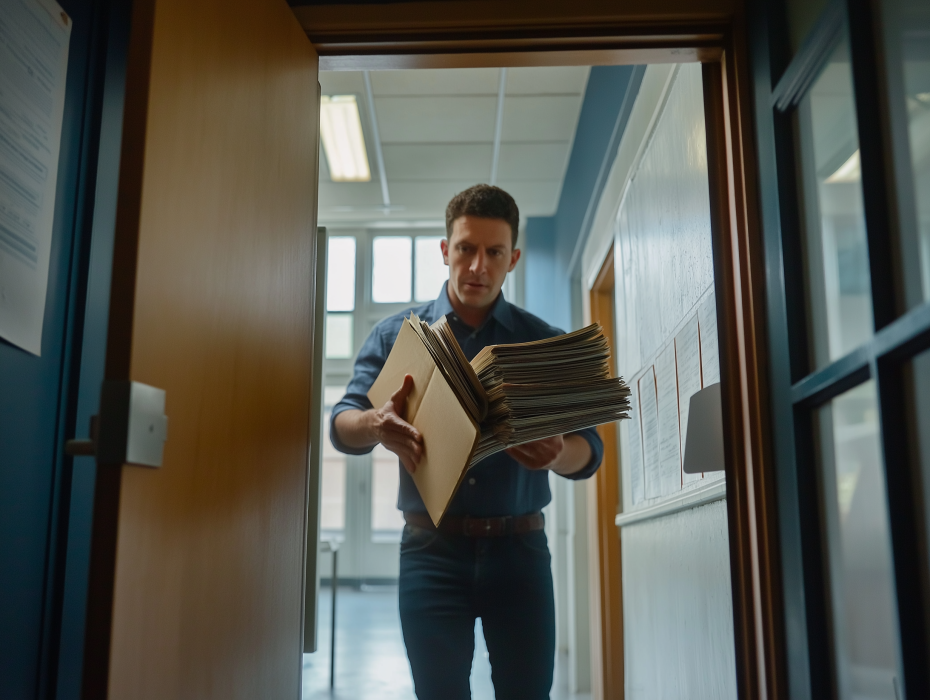
“You’re acting weird again,” Diane muttered. Carol forced a strained smile. “Just… behave, please.” Diane rolled her eyes but fell silent, the secretary’s presence keeping her subdued. For Carol, silence offered no relief. It only amplified her fear, every second drawing her closer to inevitable exposure.
Finally, the secretary’s voice rang out. “Mrs. Greene? Diane? You may go in now.” Carol rose too quickly, chair legs scraping against the floor. Diane snorted softly at her mother’s clumsiness, but Carol barely noticed. The hallway stretched before her, endless, each step echoing like footsteps from her youth.

The office was cooler than the corridor. Bookshelves lined the walls, and a neat desk sat at the center. A single photograph faced inward, hidden. Carol’s eyes darted to it, but before she could study it, the door closed behind them with a soft, decisive click.
“Please sit,” came the voice—measured, calm, deliberate. Carol’s knees nearly buckled at the sound. She guided Diane into a chair and lowered herself slowly. The voice alone carried memory: corridors filled with whispers, laughter that wasn’t laughter at all, and the unmistakable cadence of a girl she once knew.

The principal looked up. Her gaze swept across Diane, then fixed on Carol. Recognition ignited instantly, unspoken but searing. Carol’s pulse thundered. She kept her face neutral, but the weight of those eyes pressed harder with every second. Her past was alive again, seated across from her.
Diane smirked, breaking the silence. “So, am I expelled already, or do we pretend this is a fresh start?” The principal tilted her head, calm as ever. “You’ll stay—for now,” she replied. Then, after a beat: “But patterns interest me. They tell me where defiance begins.” Carol shivered.

The principal folded her hands neatly. “Your teachers describe you as… spirited.” Her eyes didn’t leave Diane’s, but Carol felt the words echo against her ribs. Spirited wasn’t praise; it was a warning. The air between them thickened, as if the office itself knew secrets neither dared name.
Diane smirked. “That’s one way to put it.” She slouched deeper, arms crossed. Carol braced for a lecture, but the principal only nodded slowly, studying her with unnerving calm. The silence stretched until even Diane shifted uncomfortably, her bravado cracking beneath the weight of quiet scrutiny.
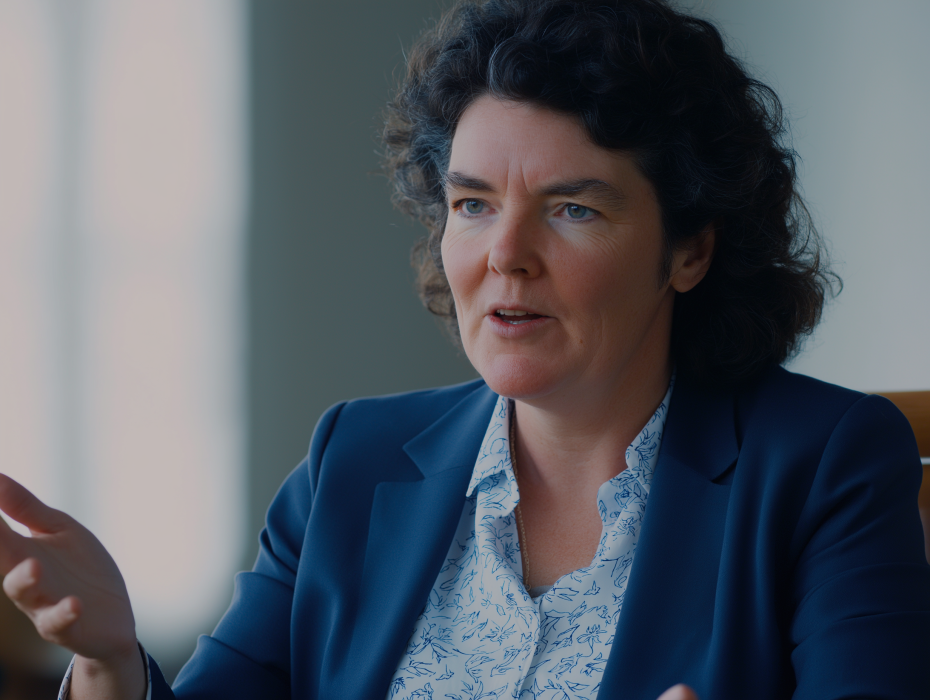
“I believe in fairness,” the principal said at last. “But fairness begins with honesty. Why do you think you’ve been sent home so often?” Diane rolled her eyes. “Because teachers can’t handle me. They’re boring. Rules are boring. I’m just being me.” Carol winced at the careless words.
The principal’s expression didn’t change. “Being yourself isn’t an excuse for cruelty.” Diane stiffened at the word. Carol’s breath caught—cruelty. It wasn’t random that she’d chosen it. The mother pressed her palms together in her lap, desperate to steady her hands. She knew the message wasn’t only for Diane.

Diane tried to shrug it off. “I’m not cruel. People laugh. It’s funny.” The principal leaned forward slightly. “Funny for you. But what about the person at the other end?” Her voice carried no heat, only steel. Diane faltered, cheeks coloring, unable to muster her usual retort.
The principal closed the folder in front of her with deliberate care. “I’ve seen this pattern before,” she said. “A child lashing out, a teacher provoking further, laughter filling the gaps.” Carol’s chest tightened. It was her history replayed through her daughter—and the person across the desk knew it.

“I don’t provoke her!” Diane snapped suddenly, defensive. “She hates me. Mrs. Connors. She makes me look stupid on purpose.” Her voice trembled with anger. The principal’s eyes flicked briefly toward Carol, then back to Diane. “And does that make you hate her back?” she asked softly.
Diane swallowed hard, caught between defiance and truth. “Maybe,” she muttered. The principal’s expression hardened. “Hatred returned only multiplies. Cruelty repeated only deepens. You think you’re defending yourself, but you’re continuing what you claim to despise.” Carol’s heart pounded. Each word sliced through her daughter—and through her.
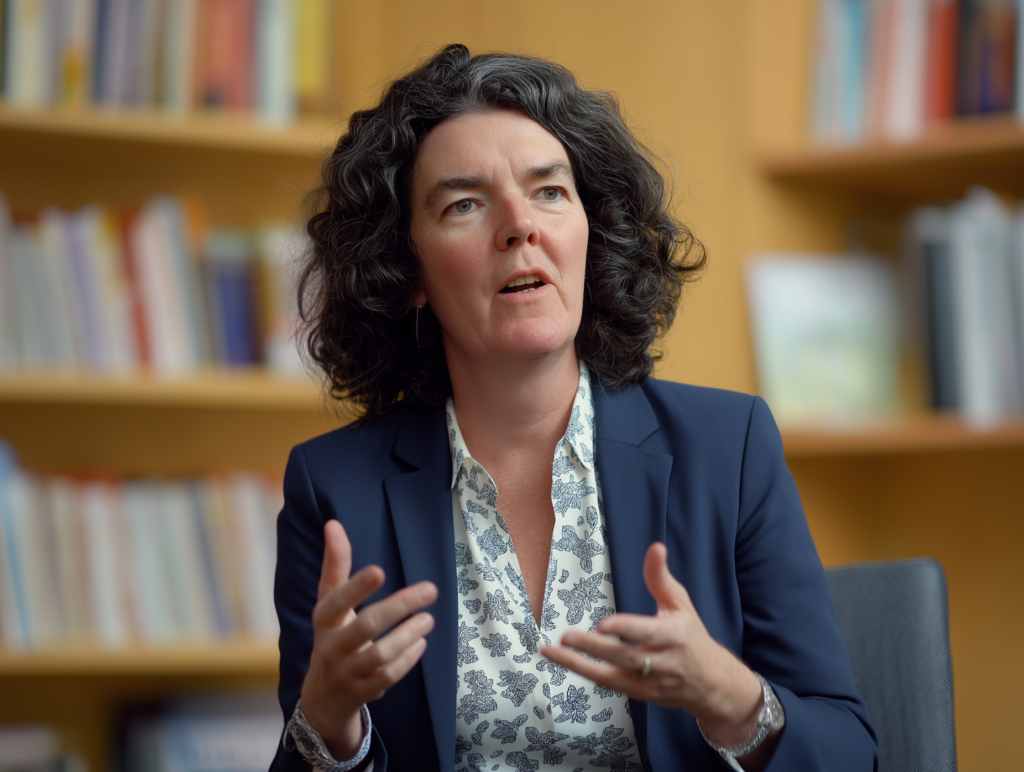
For the first time, Diane fell quiet. Her hands clenched the chair’s armrests, eyes darting down. Carol wanted to reach out to smooth the moment over, but the principal’s gaze held her still. This wasn’t a wound to be hidden. It had to sting before it could heal.
The principal’s tone softened slightly. “You are not beyond saving. But you are walking the path of those who once believed laughter erased pain. It doesn’t. It lingers. It scars.” Carol’s chest tightened until she could hardly breathe. The words were meant for Diane—but they were carved from Carol’s past.
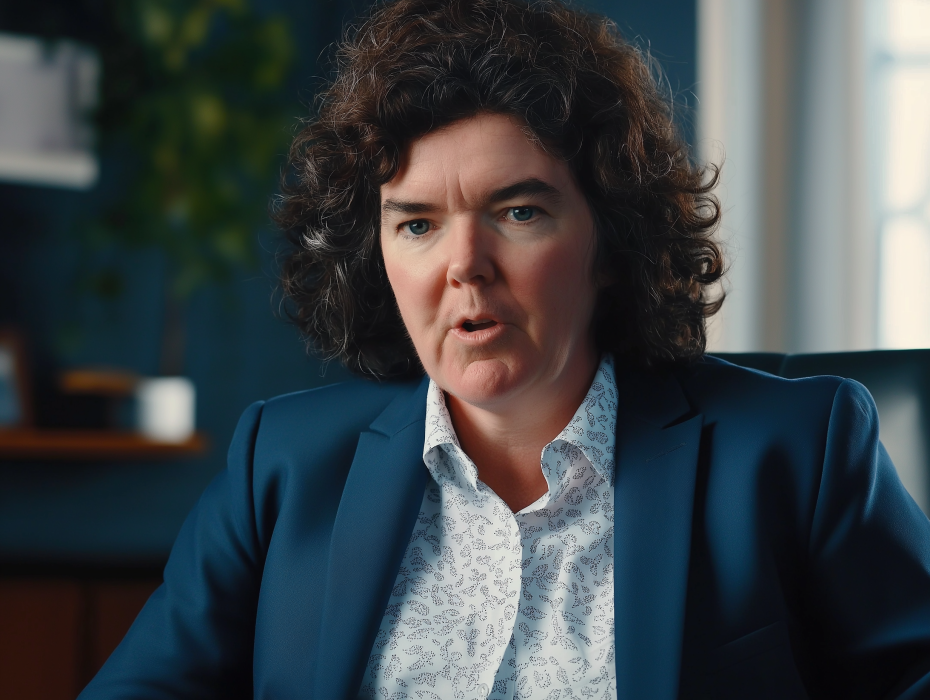
The silence that followed was unbearable. Diane shifted, tugging at her sleeve, her bravado fully gone. Finally, the principal spoke again: “I’d like a word with your mother, alone.” Diane groaned, muttering, “Nobody gets it. I’m always the one getting targeted,” but the secretary was already at the door, waiting.
Reluctantly, Diane stood, tossing a glance at her mother. Carol forced a smile, though her throat was dry. When the door closed behind her, the office shrank in an instant, leaving Carol and the principal face-to-face, the unspoken years pressing down like a storm about to break.

The principal leaned back slightly, her eyes never leaving Carol. “It’s been a long time,” she said. The words were calm, but they carried weight—years of silence, of memory, of wounds that had never healed. Carol’s pulse roared in her ears, each beat a reminder of recognition.
Carol forced a brittle laugh. “I… I don’t know what you mean.” The principal tilted her head. “Don’t you?” The question was soft, almost kind, but it left no room for denial. Carol’s hands trembled against her knees. The past had arrived, and there was nowhere to hide.
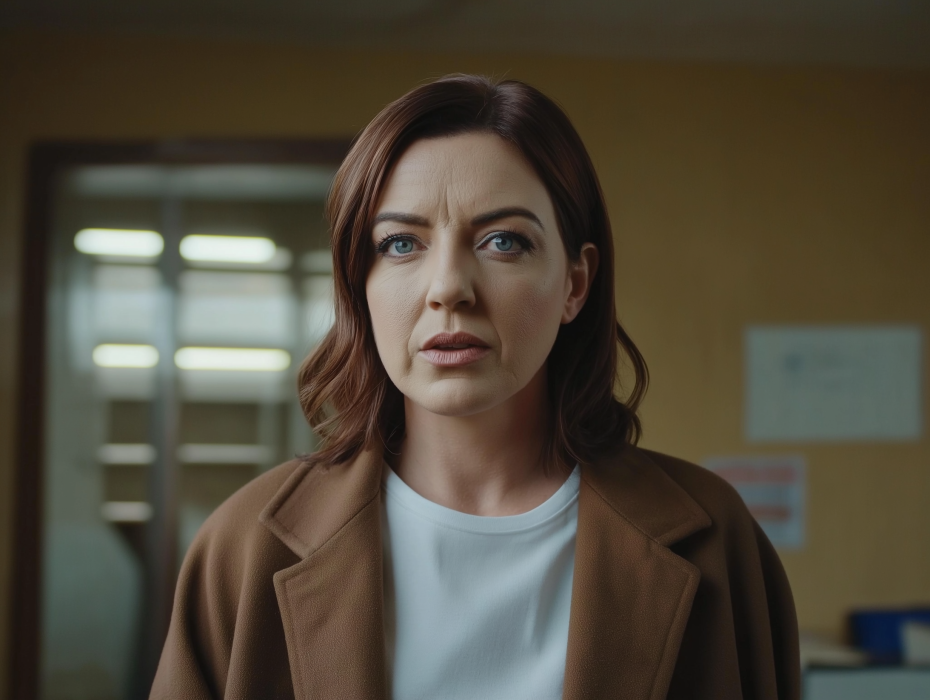
“You’ve built a life since then,” the principal continued, “but lives built on silence don’t erase beginnings.” Her voice didn’t accuse—it simply stated. Carol’s throat tightened. She wanted to protest, to explain she’d been young, thoughtless, ignorant. But the words felt hollow even before they formed.
The principal’s eyes softened, though her tone remained steady. “Children learn what they live. They pass it on. I see it in Diane. And I see it in you.” The mirror was unbearable. Carol blinked rapidly, willing back tears she hadn’t shed in decades.
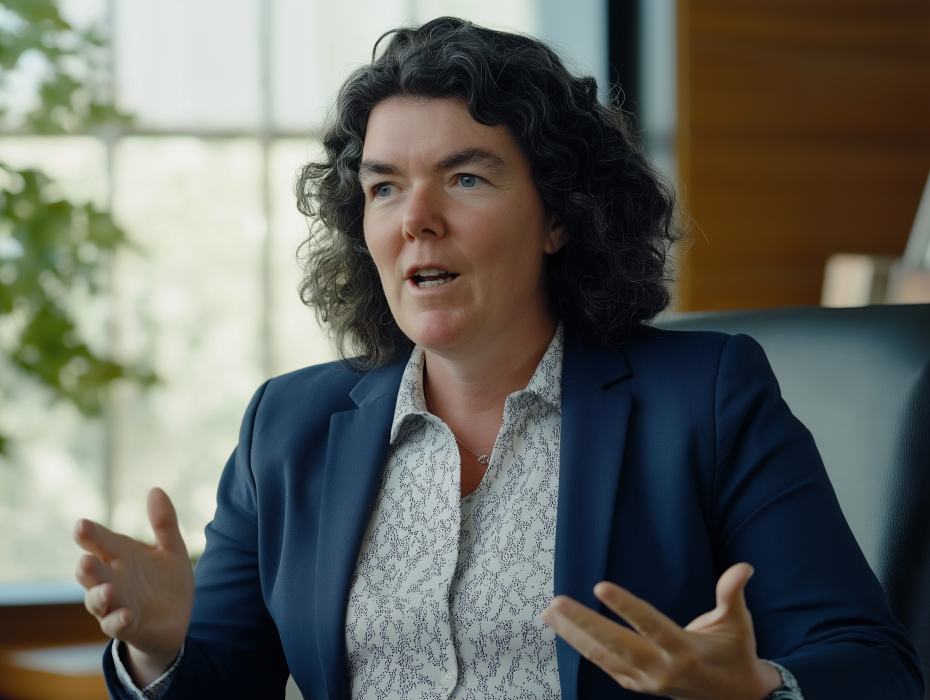
The principal leaned forward. “Do you remember me now?” Carol’s breath hitched. Recognition, once a shadow, now sharpened into certainty. She saw the girl from years ago—the one shrinking behind books, mocked daily, ignored by teachers. And herself, laughing loudest. Shame flooded her like ice water.
She whispered the name, “Ann Winters,” broken and trembling. The principal nodded, calm but unyielding. “I never forgot.” Carol wanted to speak, to apologize, but the words tangled in her throat. How could regret undo years? The silence between them was filled with decades of unspoken cruelty.
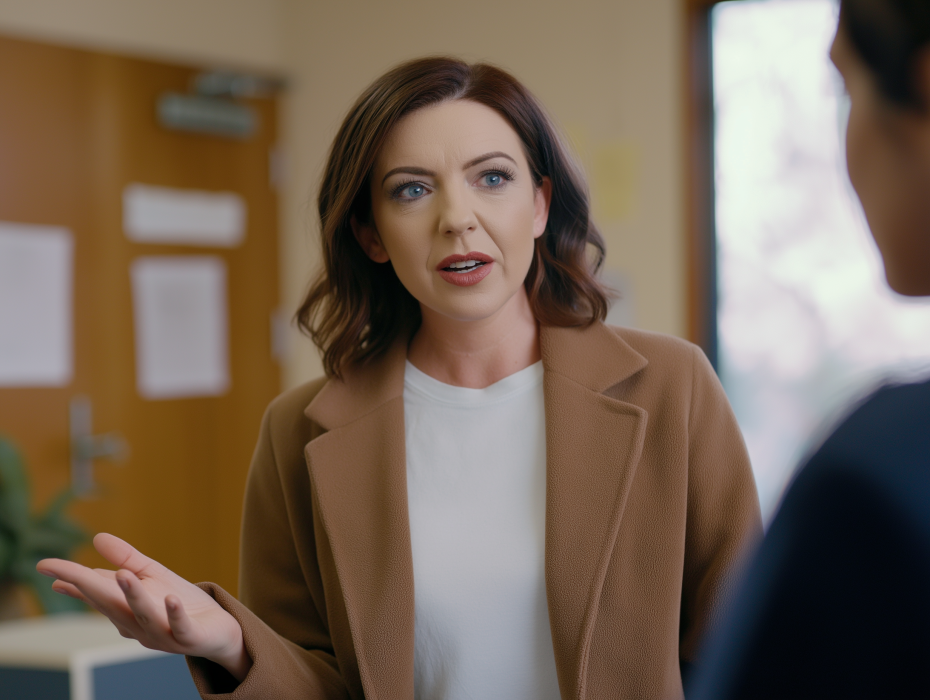
Finally, Carol choked, “I was young. I didn’t know what I was doing.” The principal’s eyes hardened. “I was young, too. I knew what you were doing. And it carved me.” Her voice didn’t rise; it didn’t need to. The truth cut sharper than anger ever could.
Carol pressed trembling hands to her lap. “I never wanted this for her,” she whispered. “Diane isn’t me.” The principal studied her, then spoke softly, “She doesn’t have to be. But she’s on the same path—and only you can show her where it ends.”
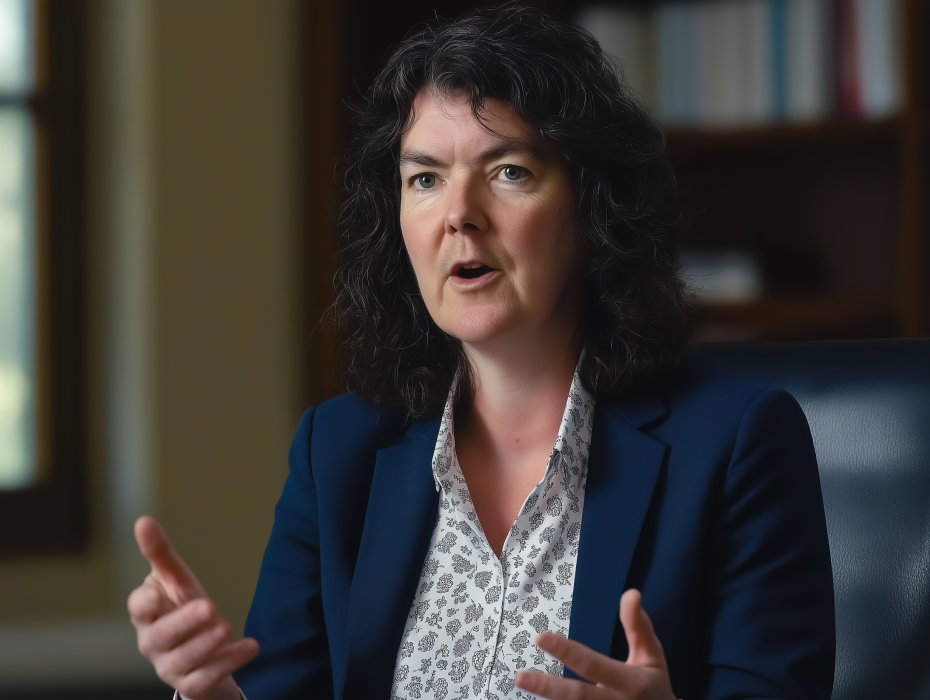
“I will speak,” the principal added, almost as an afterthought, “to Mrs. Connors as well. Teachers forget their power can wound as sharply as children’s taunts. That cycle must end.” Relief and shame tangled in Carol’s chest. It wasn’t only her daughter under judgment—it was the whole chain of cruelty.
Carol managed to whisper, “She’s not a bad child.” The principal’s eyes softened, just slightly. “Neither were you. But words change people. You know that better than anyone.” Carol nodded slowly, guilt pressing down until her spine curved beneath it. The past was no longer deniable.
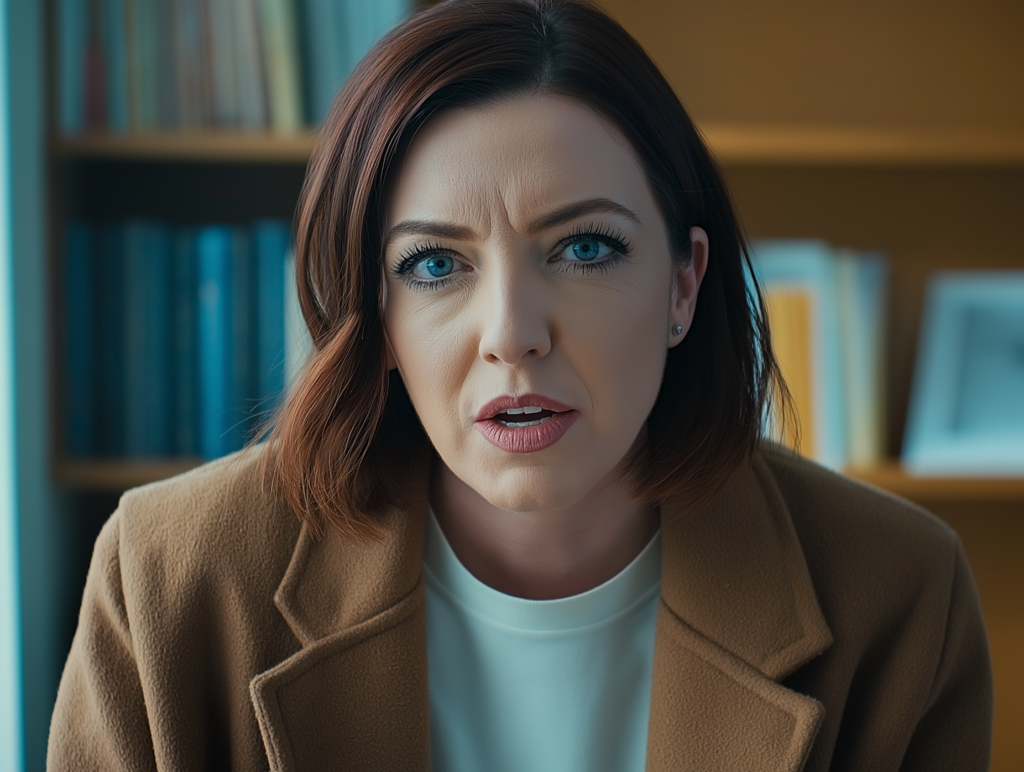
The principal’s tone hardened again. “Diane will not be expelled. But this is her final chance. And yours, too, as her guide. Teach her that cruelty ends where compassion begins.” The message struck like both punishment and mercy, binding Carol to the responsibility she had long evaded.
When Diane returned, she slumped into her chair, expectant smirk half-formed. But the principal’s gaze silenced it. “You’re staying,” she said evenly. “But only if you learn.” Diane frowned, confused. The lesson was clear: the laughter she thought harmless was no longer a game. It was a warning carved into her future.

The principal’s gaze fixed her in place. “You’ll not be expelled,” she said, voice steady. “But you must understand: cruelty isn’t clever. It wounds. And when you wound enough, you create another version of yourself you won’t like.” Saying this, she sat back in her chair.
Diane opened her mouth to argue, but faltered at the principal’s stare. The words caught in her throat. For once, silence felt heavier than defiance. She fidgeted with her sleeve, cheeks flushed. Carol saw the same sting she had once inflicted reflected now in her own daughter’s face.
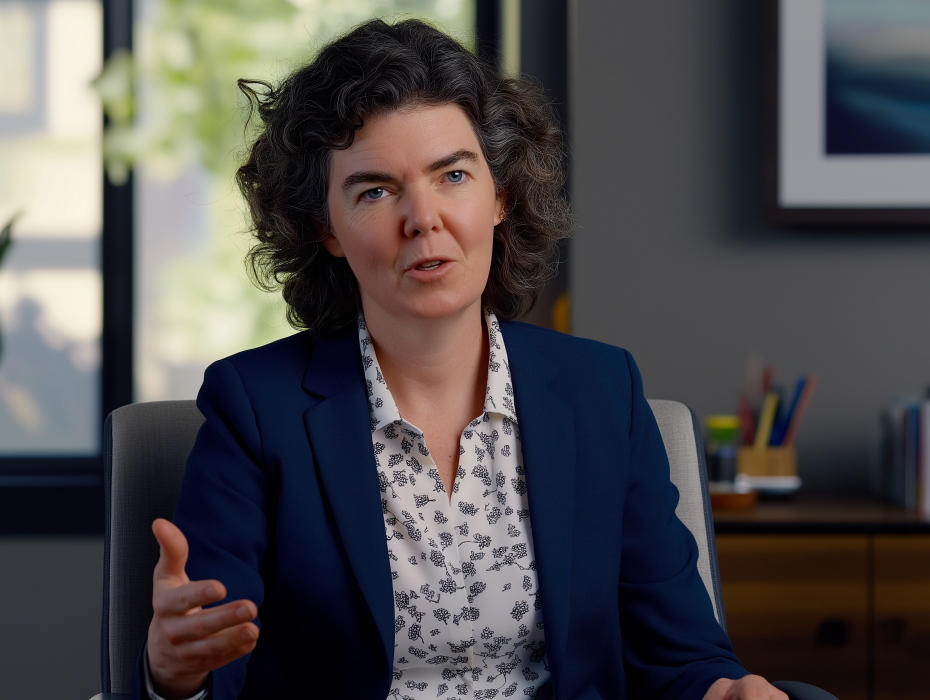
“You think it’s harmless,” the principal continued, “but scars don’t fade when the laughter stops. They stay. They grow. And one day, you’ll see them staring back at you, unchanged.” Diane dropped her gaze, unsettled by the quiet certainty of the words. Her usual armor was cracking.
The principal closed the folder firmly. “This is your warning. A pardon, not forgiveness. If you continue, the door will close for good.” Diane nodded reluctantly, a rare seriousness in her eyes. For the first time, Carol believed her daughter had heard the weight behind the words.
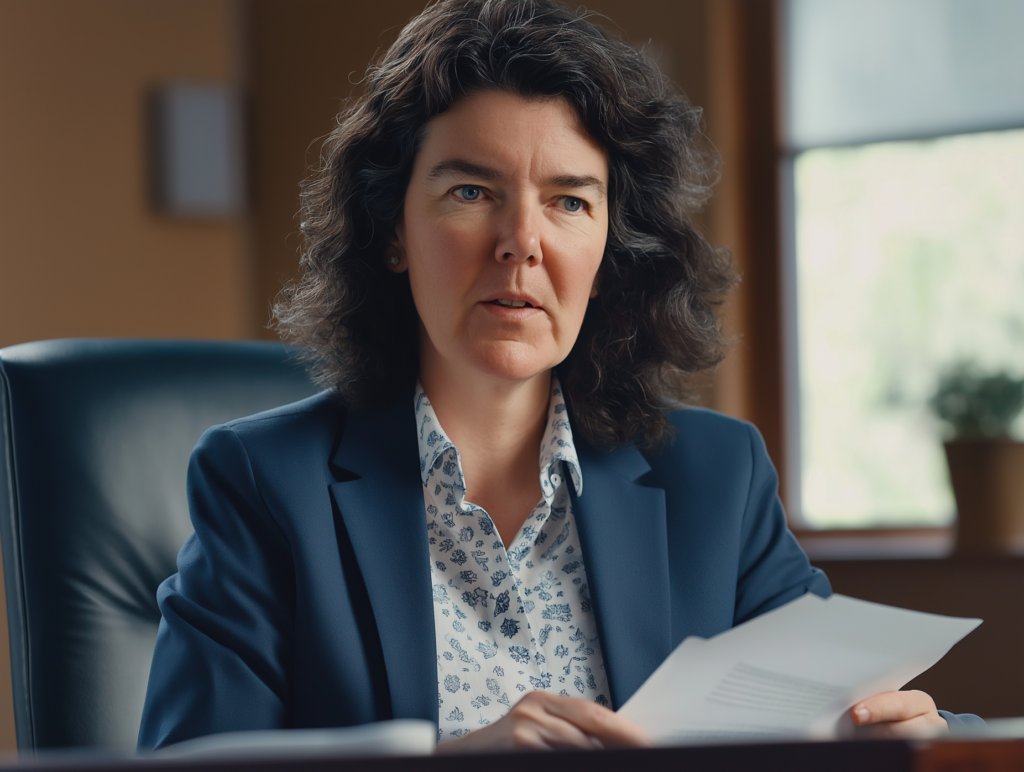
Then the principal’s tone shifted, steely. “And Mrs. Connors. She, too, will hear from me. Authority does not excuse cruelty. Teachers sometimes forget that their ridicule plants seeds that children carry for life. I will not allow that cycle to repeat under my watch.” Carol’s chest eased at the justice unspoken for years.
Diane blinked, startled. “She… she picks on me,” she admitted quietly. The principal nodded. “I know. And it ends now. You will change, and so will she. Both sides must stop pretending their pain gives them license to wound others.” Carol felt the words strike them both equally.
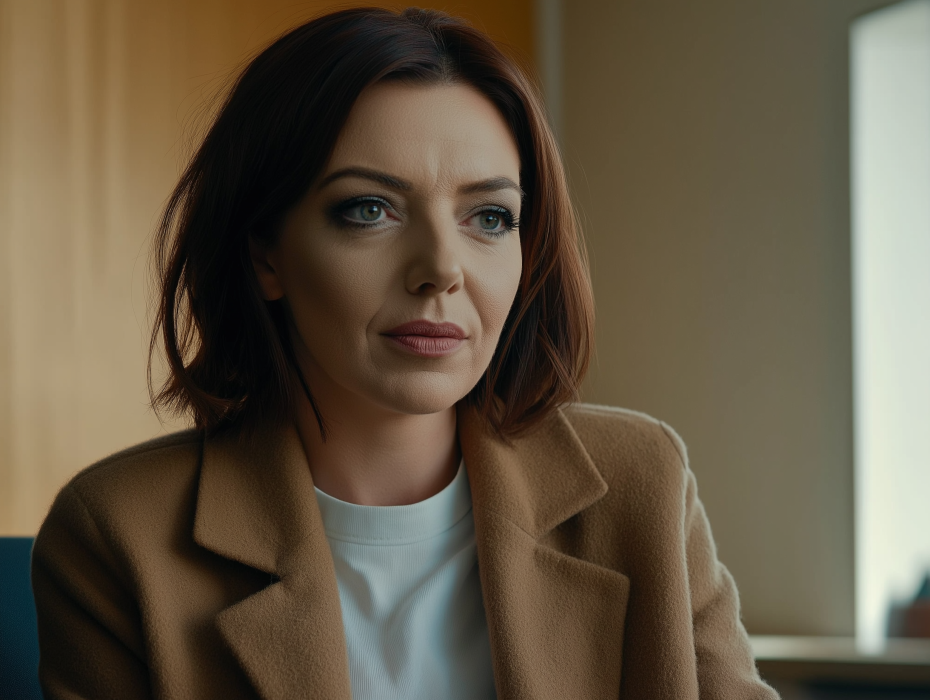
Carol whispered, “Thank you,” though the gratitude carried the weight of guilt. The principal met her eyes firmly. “Don’t thank me. Show her. Teach her. Break the pattern.” Carol nodded, her heart heavy, knowing this was the chance she had long prayed for—and long feared.
Diane shifted uncomfortably. “So I’m… not expelled?” The principal’s lips curved faintly. “Not today. But your choices decide tomorrow.” Diane nodded again, slower this time, seriousness replacing her usual mockery. For once, she looked like a child—not invincible, but vulnerable, capable of change.

The meeting ended with a final glance—principal to mother, mother to daughter. No words could capture the weight of what had passed. As they left the office, the air felt lighter, yet heavier all at once. The cycle had been exposed, and breaking it was now their burden.
In the corridor, Diane walked silently, for once not dragging her feet or cracking a joke. Carol matched her pace, glancing at her daughter’s lowered eyes. The silence between them was uneasy but fragile, like new glass—one careless word could shatter it completely.

Outside, the sunlight seemed too bright. Diane squinted, muttering, “She’s… scary.” Carol swallowed a reply. What she wanted to say was: No. She’s strong. Stronger than I ever was. Instead, she only nodded, holding her daughter’s shoulder lightly as though afraid she’d slip from her grasp.
That evening, Diane avoided her usual theatrics. She ate dinner quietly, eyes on her plate, words clipped short. Carol didn’t press. She knew silence could do more than lectures sometimes. In silence, the warnings could echo louder, unchallenged by mockery.

Later, Carol found herself standing at Diane’s doorway, watching her daughter sketch absentmindedly. No headphones, no phone buzzing. Just stillness. It was fragile, maybe fleeting, but it was change. For the first time in months, Carol let herself hope her daughter had truly heard what mattered.
Alone in her own room, Carol thought of the principal again—the girl she had once tormented, the woman she now owed. Regret clawed at her, but so did resolve. She couldn’t undo the past, but she could keep it from shaping Diane’s future. That much was still possible.

The next day, Carol received an email from the school. A note from the principal: “Mrs. Connors has been reminded of her duty. Bullying, at any age, is unacceptable.” Carol read it twice, a strange mix of shame and relief flooding her chest. Cycles could be broken.
When Diane came home, she muttered, “Connors didn’t say a word to me today.” There was confusion and almost disbelief in her voice. Carol only nodded. “Maybe people can change,” she said softly, though she knew the words were as much for herself as for her daughter.
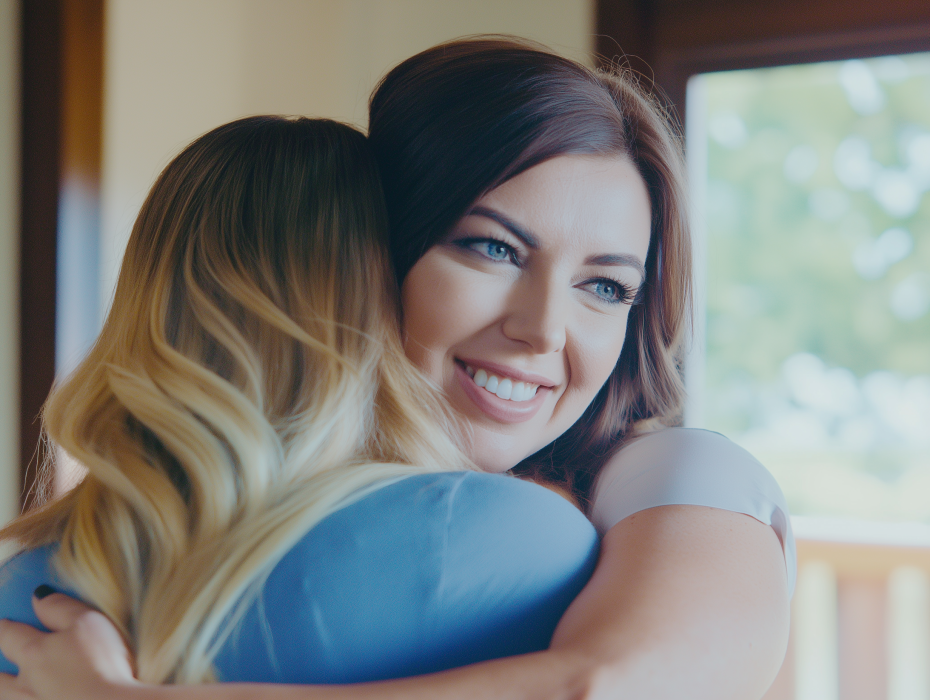
That night, as mother and daughter sat in rare quiet together, Carol finally felt the ground beneath her steady. The past had resurfaced, yes—but it had not destroyed them. Instead, it left behind a warning, etched deeply: cruelty repeated destroys, but cruelty stopped can save.
